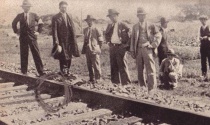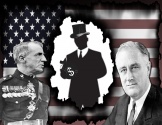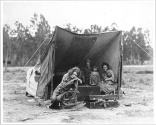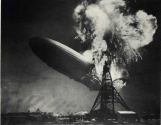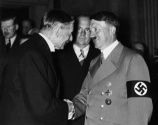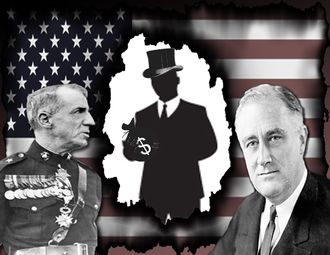Difference between revisions of "1930s"
(Created page with "{{decade |image= |description= |constitutes= }} {{SMWDocs}} ==References== {{reflist}} {{Stub}}") |
|||
| (9 intermediate revisions by the same user not shown) | |||
| Line 1: | Line 1: | ||
{{decade | {{decade | ||
| − | |image= | + | |image=1930s.jpg |
| − | |description= | + | |image_caption=An image of the "[[great depression]]" in the US. |
| + | |description=A military build up in Europe culminated in [[World War II]]. | ||
|constitutes= | |constitutes= | ||
}} | }} | ||
| + | The '''1930s''' was a time of increasing concern about [[fascism]] in [[Europe]], and saw a [[The Business Plot|failed fascist coup]] in the USA. | ||
| + | |||
| + | ==The Great Depression== | ||
| + | {{FA|The Great Depression}} | ||
| + | In the US particularly, widespread deprivation was labelled "[[The Great Depression]]". | ||
| + | |||
| + | ===The Business Plot=== | ||
| + | {{FA|The Business Plot}} | ||
| + | [[image:Business Plot.jpg|left|330px]] | ||
| + | A cabal of [[Wall St]] businessmen organised a fascist coup in USA. Their conspiracy was exposed when the front man, General [[Smedley Butler]] [[blew the whistle]] on the group. The group used its [[control of the corporate media]] to try to airbrush the plot from the historical record, a ''[[New York Times]]'' editorial terming it a "gigantic hoax." and a "bald and unconvincing narrative." | ||
| + | |||
| + | ==Military build up in Europe== | ||
| + | The 1930s saw a rise in [[fascism]] in Europe, and a large military build up. Some [[Wall St]] investors, such as [[Prescott Bush]]{{cn}} and [[Brown Brothers Harriman]] helped [[Fritz Thyssen]] finance [[Adolf Hitler]].<ref>https://www.theguardian.com/world/2004/sep/25/usa.secondworldwar</ref> | ||
| + | |||
| + | ==World War II== | ||
| + | {{FA|World War II}} | ||
| + | In 1939, [[Adolf Hitler]]'s Germany staged a [[false flag]] incident, the [[Gleiwitz Incident]], and then invaded [[Poland]]. [[UK]] and [[France]] declared [[war]] as a response. | ||
| + | |||
| + | ==Reefer Madness== | ||
| + | In USA, an intense anti-[[marijuana]] movement coalesced with an anti-Chicano; since marijuana was associated with Mexican-Americans, a ban on marijuana was seen as a way of discouraging Mexican-American subcultures from developing.<ref>https://www.thoughtco.com/why-is-marijuana-illegal-721155</ref> The 1937 [[Marijuana Tax Act]] levied an almost prohibitive tax on the drug and it was alleged to be a "gateway drug" that lead to [[heroin]] use<ref>https://www.thoughtco.com/history-of-the-war-on-drugs-721152</ref>, as promoted by the film ''[[Reefer Madness]]''. | ||
{{SMWDocs}} | {{SMWDocs}} | ||
==References== | ==References== | ||
{{reflist}} | {{reflist}} | ||
| − | |||
Latest revision as of 16:45, 13 January 2020
| 1920s« | |
|---|---|
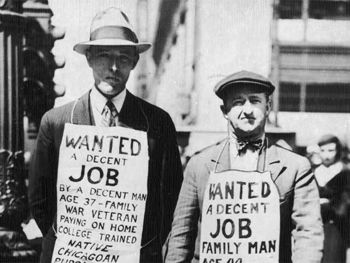 An image of the "great depression" in the US. | |
| A military build up in Europe culminated in World War II. |
The 1930s was a time of increasing concern about fascism in Europe, and saw a failed fascist coup in the USA.
Contents
The Great Depression
- Full article:
 The Great Depression
The Great Depression
- Full article:
In the US particularly, widespread deprivation was labelled "The Great Depression".
The Business Plot
- Full article: The Business Plot
- Full article: The Business Plot
A cabal of Wall St businessmen organised a fascist coup in USA. Their conspiracy was exposed when the front man, General Smedley Butler blew the whistle on the group. The group used its control of the corporate media to try to airbrush the plot from the historical record, a New York Times editorial terming it a "gigantic hoax." and a "bald and unconvincing narrative."
Military build up in Europe
The 1930s saw a rise in fascism in Europe, and a large military build up. Some Wall St investors, such as Prescott Bush[citation needed] and Brown Brothers Harriman helped Fritz Thyssen finance Adolf Hitler.[1]
World War II
- Full article: World War II
- Full article: World War II
In 1939, Adolf Hitler's Germany staged a false flag incident, the Gleiwitz Incident, and then invaded Poland. UK and France declared war as a response.
Reefer Madness
In USA, an intense anti-marijuana movement coalesced with an anti-Chicano; since marijuana was associated with Mexican-Americans, a ban on marijuana was seen as a way of discouraging Mexican-American subcultures from developing.[2] The 1937 Marijuana Tax Act levied an almost prohibitive tax on the drug and it was alleged to be a "gateway drug" that lead to heroin use[3], as promoted by the film Reefer Madness.

